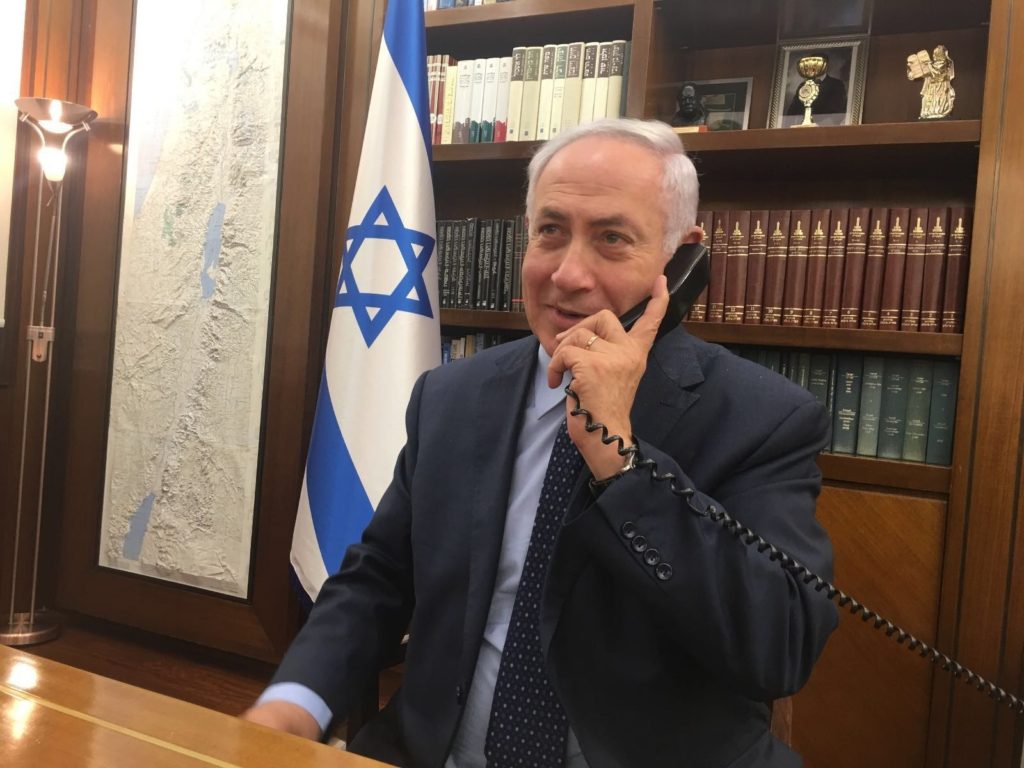
In yet another symbol of the improving relations between Israel and its Arab neighbors, incoming Israeli Prime Minister Benjamin Netanyahu over the weekend received congratulatory calls welcoming him back into the role from not one, but two Arab leaders. Netanyahu, despite being sworn in for his sixth term as prime minister last Thursday, had an opportunity on Saturday for what was personally a new experience in receiving the congratulatory call from the President of the United Arab Emirates. Netanyahu was already prime minister when the UAE signed the Abraham Accords with Israel in 2020 to formally normalize diplomatic relations between the sides.
According to an Israeli readout of the call, UAE President Mohammed bin Zayed “repeated his invitation” for Netanyahu and his wife Sara to travel on an official visit to the UAE. The two leaders agreed that “the visit would take place soon.”
One day after that call, Netanyahu started the new year off diplomatically with a call from Egyptian President Abdel Fattah El-Sisi. The conversation, according to an Israeli readout, said the two leaders “expressed their desire to promote bilateral relations between Egypt and Israel in all fields.”
While Iran was not explicitly mentioned in the readout from either the Israeli or Egyptian side, the Israeli summary nearly matched the Egyptian wording exactly in stating the discussion addressed “recent developments in both the international and the regional arenas.”
Not every topic was recapped the same. The Egyptians, who take the Palestinian side diplomatically in the latter’s conflict with Israel, made sure to explicitly note that matter in their summary of the call posted on the Egyptian Presidency website. The Egyptian readout said that Cairo would “continue its intensive efforts on all files related to the Palestinian cause, foremost of which are efforts to maintain calm between the Palestinians and Israelis and to resume negotiations between the two sides.”
Per the Egyptian summary, El Sisi did not point out the Palestinians have repeatedly refused to participate in the US-sponsored peace process that led to the Abraham Accords, but instead commented on the “need to avoid any measures that would lead to tension and complicate the situation in the region.”
For Israel’s part, their readout took a more universal diplomatic perspective by stating that the leaders of Israel and Egypt “stressed the importance of promoting peace, stability and security for the sake of both peoples and for all peoples in the Middle East.”
Sunday’s call wasn’t the first time Netanyahu had expressed that peaceful goal since taking office. On Thursday in Netanyahu’s first cabinet meeting since retaking the Prime Minister’s chair, according to an Israeli press release, one of his “four main goals” for the newly-formed Israeli government is to “dramatically expand the circle of peace.” Said Netanyahu of this diplomatic ambition, “I believe that this is within reach.”
In the meantime, the circle of peace has already grown since the last time Netanyahu took office, thanks to the Abraham Accords. Netanyahu isn’t the only one who received a special congratulatory call upon taking office from a partner who signed the Accords: New Israeli Foreign Minister Eli Cohen was contacted by UAE counterpart Abdullah bin Zayed.
Per a Twitter post from the UAE Office of the Minister of Foreign Affairs account, Zayed on the call not only offered his congratulations to Cohen, but also noted the “UAE’s interest in strengthening bilateral relations between” the UAE and Israel, “which have witnessed notable growth over the past two years.”
(By Joshua Spurlock, www.themideastupdate.com, January 1, 2023)
